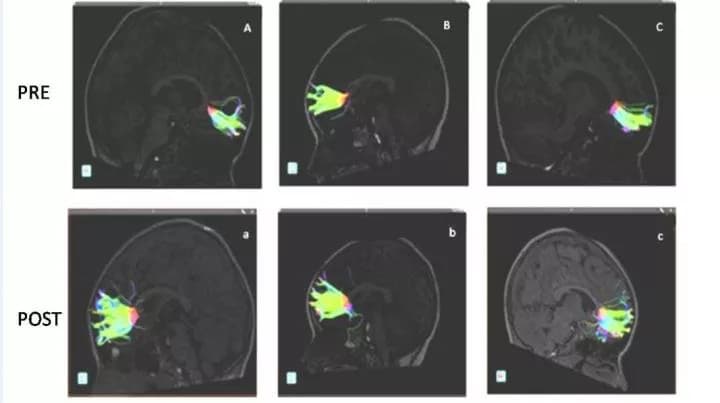
Musical Training Creates New Brain Connections In Children
Taking music lessons increases brain fiber connections in children and may be useful in treating autism and Attention Deficit Hyperactivity Disorder (ADHD), according to a study being presented next week at the annual meeting of the Radiological Society of North America (RSNA).
"It's been known that musical instruction benefits children with these disorders," said Pilar Dies-Suarez, M.D., chief radiologist at the Hospital Infantil de México Federico Gómez in Mexico City, "but this study has given us a better understanding of exactly how the brain changes and where these new fiber connections are occurring."
The researchers studied 23 healthy children between the ages of five and six years old. All of the children were right handed and had no history of sensory, perception or neurological disorders. None of the children had been trained in any artistic discipline in the past.
The study participants underwent pre- and post-musical-training evaluation with diffusion tensor imaging (DTI) of the brain. DTI is an advanced MRI technique, which identifies microstructural changes in the brain's white matter.
"Experiencing music at an early age can contribute to better brain development, optimizing the creation and establishment of neural networks, and stimulating the existing brain tracts," Dr. Dies-Suarez said.
The brain's white matter is composed of millions of nerve fibers called axons that act like communication cables connecting various regions of the brain. Diffusion tensor imaging produces a measurement, called fractional anisotropy (FA), of the movement of extracellular water molecules along axons. In healthy white matter, the direction of extracellular water molecules is fairly uniform and measures high in fractional anisotropy. When water movement is more random, FA values decrease, suggesting abnormalities.
Over the course of life, the maturation of brain tracts and connections between motor, auditory and other areas allow the development of numerous cognitive abilities, including musical skills. Previous studies have linked autism spectrum and ADHD with decreases in volume, fiber connections and FA in the minor and lower forceps, tracts located in the frontal cortex of the brain. This suggests that low connectivity in the frontal cortex, an area of the brain involved in complex cognitive processes, is a biomarker of these disorders.
After the children in the study completed nine months of musical instruction using Boomwhackers -- percussion tubes cut to the exact length to create pitches in a diatonic scale, DTI results showed an increase in FA and axon fiber length in different areas of the brain, most notably in the minor forceps.
"When a child receives musical instruction, their brains are asked to complete certain tasks," Dr. Dies-Suarez said. "These tasks involve hearing, motor, cognition, emotion and social skills, which seem to activate these different brain areas. These results may have occurred because of the need to create more connections between the two hemispheres of the brain."
The researchers believe that the results of this study could aid in creating targeted strategies for intervention in treating disorders like autism and ADHD.
Materials provided by Radiological Society of North America. Note: Content may be edited for style and length.
Disclaimer: DoveMed is not responsible for the adapted accuracy of news releases posted to DoveMed by contributing universities and institutions.
Related Articles
Test Your Knowledge
Asked by users
Related Centers
Related Specialties
Related Physicians
Related Procedures
Related Resources
Join DoveHubs
and connect with fellow professionals

0 Comments
Please log in to post a comment.